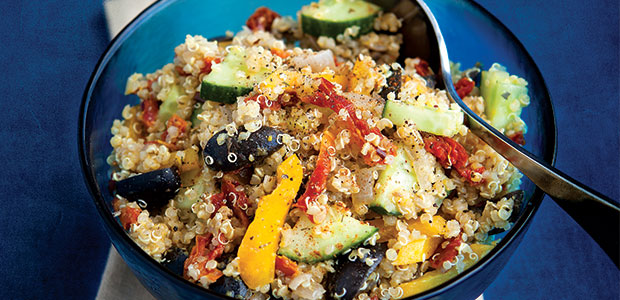Advertisement
Healthy Make-Ahead Meals
Tasty results you'll look forward to

Lack of time and energy during a stressful workweek often prevents us from regularly eating healthy meals, which can set off a vicious cycle. Over time, an unhealthy diet can contribute to the development of lifestyle-related diseases, such as type 2 diabetes, that further hinder our well-being.
Not many of us have the luxury of retiring early or hiring a personal chef, so what can we do to eat well and lower our risk of disease?
Planning and making healthy meals ahead of time is an excellent strategy for ensuring that we have nutritious meals on hand during the busy workweek. According to the Public Health Agency of Canada, eating healthy portions of high-fibre, low-fat foods and plenty of fruits and vegetables can help us ward off type 2 diabetes by keeping us at a healthy weight.
This article features appetizing recipes that are ideal for making ahead of time—with tasty results you’ll look forward to during your busy workweek. They’re wholesome, versatile, can be halved and doubled easily, and are great in lunches and dinners alike.
After a few weeks of preparing healthy dishes such as these ahead of time, and then enjoying the nutritious and delicious products of your thoughtful planning, you’ll never want to go back to last-minute meal making.
Recipes
- Greek Quinoa Salad
- Thai Oven Roast
- Black Bean Veggie Burgers with Sesame Sauce
- Crockpot Gumbo
- Red Wine and Maple Sushi
Make-ahead meals: tips for getting started
- Schedule about six hours—a morning, an afternoon, or an evening—for cooking time.
- Enlist family and friends who also want to make some of their meals ahead of time to join you—the more the merrier, and the more likely you are to get cooking under social pressure from your pals.
- Choose recipes and make a shopping list a few days ahead of time to ensure that you’ll have everything you need when your scheduled cooking time arrives.
- Select only a small handful of dishes to make each week and prepare them in large batches. If you like variety, freeze some dishes each week for a later week so you can enjoy a different dish each day.
- Remember that preparing large batches of food necessitates bigger bowls, pots, and pans and more oven dishes. To avoid frustration, make sure that you have the necessary kitchen equipment before getting started. Remember also to have containers on hand in which to store your prepared dishes.
- Label frozen dishes with the date on which they were prepared and the ingredients they contain.




